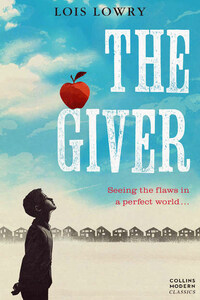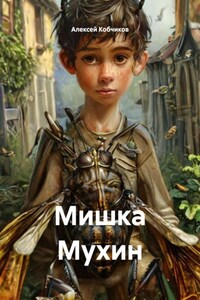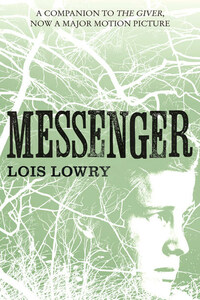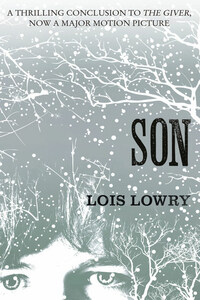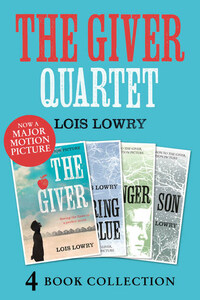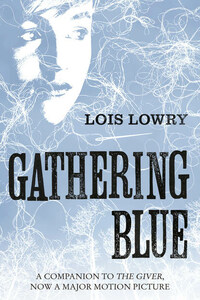Lois Lowry is one of the most outstanding writers for children and young adults in the USA. She is well known for her stories about Anastasia Krupnik â funny stories that have been hugely popular with young readers since the first one was published in 1979.
Lois Lowry has said that she got the ideas for the Anastasia stories from remembering her own childhood and, later, from her own experiences as a parent. But The Giver is a very different sort of story from the stories about Anastasia. And it shows that Lois Lowry can write a sinister book as well as a funny one.
The Giver is possibly the most alarming story of all her books â a disconcerting book ⦠a book for young adults and adults, rather than younger children, though good and thoughtful readers of perhaps eleven up could certainly read it with understanding and appropriately mounting apprehension.
Jonas, the hero of The Giver, lives a highly ordered life as a member of a group who describe themselves as âthe communityâ. And, though Jonas is happy enough with his parents, his lively sister and his friends, he is also beginning to experience strange moments of visions ⦠visions that belong to him alone. He is moving towards great changes, and we the readers move with him. We come to understand that the life lived within his community is ominous as well as protected. People around Jonas have chosen to live extremely ordered lives but, as the story unfolds, the reader comes to see that this order has a particularly dark side. Memories of colour and music for example have been surrendered. But these memories are not altogether lost. They are contained and held by a mysterious man called the Giver. A lot of the story deals with the relationship between Jonas and the Giver â a man who is beyond the community, and a container of those memories of feeling and colour which he can pass on to Jonas, who will (it is expected) become a Giver himself. In order to communicate with the present Giver Jonas is released from the rules that govern everyone else around him, so the story becomes very much a story of self realisation â a self realisation that is expected, ultimately, to enrich a group of people denied self realisation themselves.
As for the ending â well, the reader has to make up his or her own mind about the ending. Is it realistic? Is it symbolic?
Lois Lowry has written a note about The Giver (which you can read at the end of this book), saying that she did not immediately realise that it was different from any other book she had written, until she started receiving letters from readers (mostly adults) in the outside world proving that the story was being widely read. Many people praised it but there were some towns that banned it from their schools and libraries. Lois had intended to write a childrenâs adventure story, but The Giver turned out to be more than that. While some people hated it, others admired it and in 1993 it won the Newbery Medal.
The Giver is a book that is hard to put down â a book that haunts the reader for days after it has been closed. Have a go!
Margaret Mahy
Margaret Mahy was one of the worldâs best-loved authors, writing wonderfully funny childrenâs stories and ground-breaking novels for young adults. Margaret was awarded the Order of New Zealand in 1993 for her internationally acclaimed contribution to childrenâs literature and has twice won Britainâs Carnegie Medal for Childrenâs Literature, for her books The Haunting and The Changeover. In 2006, Margaret was presented with the prestigious Hans Christian Andersen Award. She passed away in 2012.
First published in the USA by Houghton Mifflin Co. in 1993
First published in Great Britain by HarperCollins Childrenâs Books in1994
This edition published by HarperCollins Childrenâs Books 2017
HarperCollins Childrenâs Books is a division of HarperCollinsPublishers Ltd,
1 London Bridge Street
London SE1 9GF
The HarperCollins Childrenâs Books website address is www.harpercollins.co.uk
Text copyright © Lois Lowry 1993
A note from the author copyright © Lois Lowry 2003
Why Youâll Love This Book copyright © Margaret Mahy 2008
Cover design © HarperCollins Publishers 2017 Cover illustration © Kate Gaughran
Lois Lowry asserts the moral right to be identified as the author of this work
A catalogue copy for this book is available from the British Library
All rights reserved under International and Pan-American Copyright Conventions. By payment of the required fees, you have been granted the non-exclusive, non-transferable right to access and read the text of this e-book on-screen. No part of this text may be reproduced, transmitted, down-loaded, decompiled, reverse engineered, or stored in or introduced into any information storage and retrieval system, in any form or by any means, whether electronic or mechanical, now known or hereinafter invented, without the express written permission of HarperCollins
Source ISBN: 9780007263516
